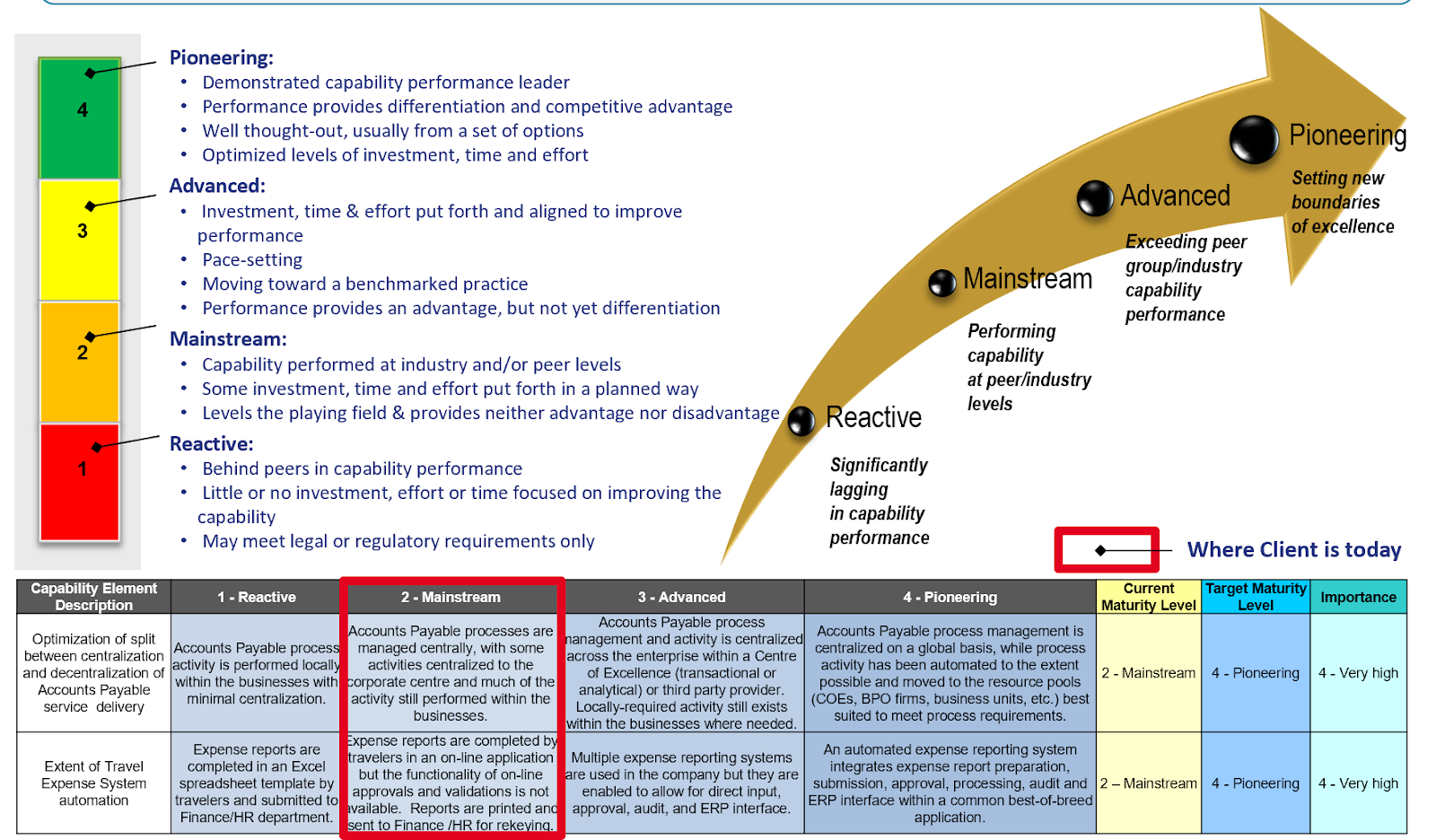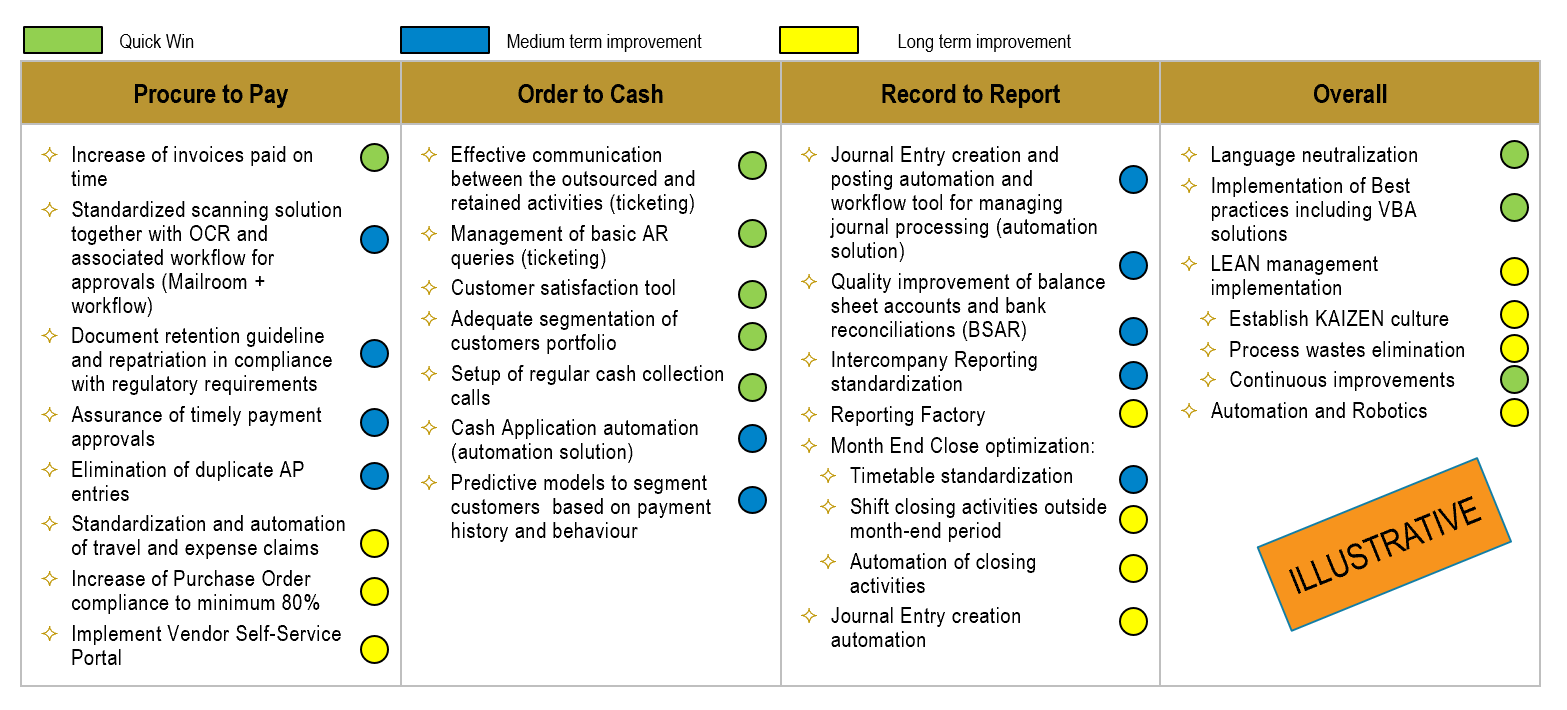
Posted on: Apr 22, 2023
What is process maturity assessment?
The Finance Capability Maturity Model is a tool for assessing the current maturity level of the organization’s various capabilities, and for capturing the maturity level it seeks to achieve, as well as the relative importance of making progress in each area. The process maturity assessment is based on the following areas:
1. Assessment of GBS governance structure, process harmonization and measurement, covering:
- Scope of processes
- Technology
- Time consumption
- Skillset of people
2. Assessment of processes:
- Review of core processes for efficiency and(or) quality gaps, based on benchmarks to best practices
- Recommendation of improvements, including the estimation of expected benefits
3. Assessment of Internal control:
- Review of GBS internal control model and environment
- Identification of internal control weaknesses and areas for improvement
4. Proposal of TOM – Target Operating Model, including efficiency gain from the proposed options:
- Further process centralization
- Selling the Centre
- Hybrid model
- Continuing of existing model
- Process maturity assessment – step by step
Ideally, the process maturity assessment should consists of the following steps:
Step 1: PROJECT SCOPE & PLANNING
- Kick-off workshop with Client
- Agreement on scope and areas of review
- Confirmation of project plan and team’s availability
- Preparation of required documents lists
Step 2: COLLECTION & REVIEW
- Collection and detailed analysis of the provided documentationv
- Follow-up on question marks with Process Owners & Key Users
- Preparation (and distribution) of the initial pre-audit questions and(or) questionnaires
- Identification of process documentation details required for on-site audit
Step 3: ON-SITE INTERVIEWS
- Review of organization structure and governance, communication channels and reporting lines
- Discussion re the on-going improvement projects and ideas
- On-site workshops or series of interviews
- Review and discussion re the process maps, tools and workflows applicable for the processes, current operating and governance models, currently measured SLAs/KPIs, control points in the process
Step 4: ANALYSIS & REPORT DEVELOPMENT
- Developing long and short-term improvement initiatives
- Evaluating maturity of processes in GBS
- Comparing performance and IT Tools with market
- Evaluating potential changes in process
- Concluding on IT Landscape and other tools opportunities
- Defining potential adjustments to the target operating model
Step 5: SUMMARY & RECOMMENDATIONS
- Discussion of the project findings and initial recommendations with Process Owners
- Concluding process change recommendations and market best practices
- Final documentation of the technology and AI opportunities
- Presentation of the project outcomes to Client Management Team


Importance of process maturity assessment
Process maturity assessment is nothing more than:
- Benchmarking
- Fresh & external point of view
- Market trends & Best Practices
However, to obtain the expected results of this program, the below mentioned factors must be addressed:
- Proper alignment of project scope and timelines
- Effective communication between both parties (Adaptive Team and Client organization management)
- Availability of the Client team members and respective stakeholders for assessment interviews
- Smooth flow of requests and responses wrt documentation and information to be provided
- Project plan aligned to eventual holiday plans and expected workload peaks
So what’s your opinion now? Is it worth considering conducting a process maturity assessment in your organization? Or are you still hesitating? Call ADAPTIVE GROUP and we will discuss the details together.
Author:

